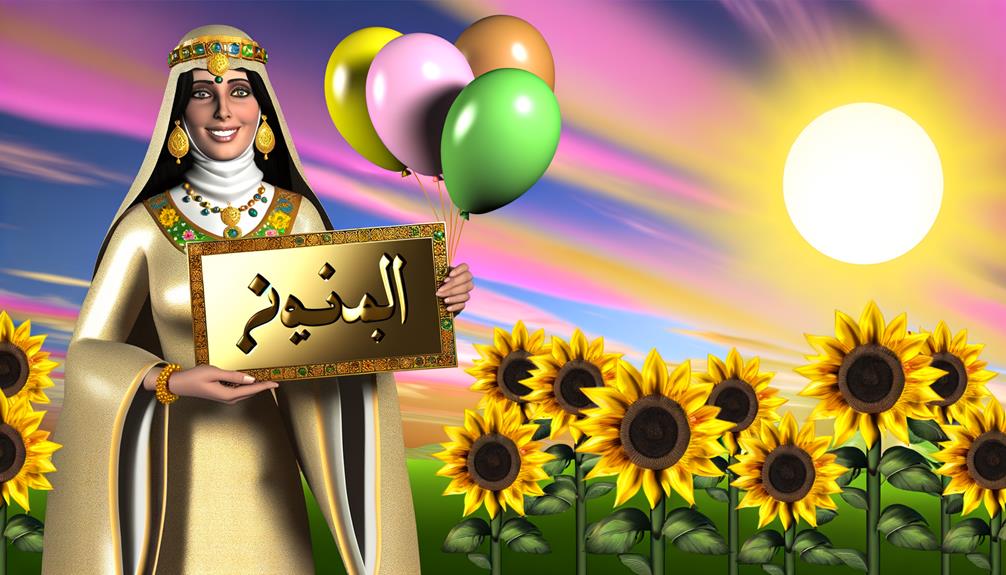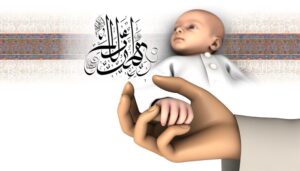Farah Name Meaning in Arabic
Farah, rooted in Arabic culture, embodies positivity and optimism as it translates directly to 'joy' or 'happiness'. It reflects the Arab world's emphasis on cheerful emotions and is universally symbolic of upliftment.
From a numerology perspective, Farah totals to 25, reduced to a single digit, 7, signifying introspection and spiritual awakening. This joyfully emblematic name, pronounced 'Far-rah', is used globally, resonating happiness across cultures.
You'll find interesting variations of Farah worldwide, and it's a common pick among celebrities. Plus, there's a lot more to uncover about the cultural significance and influence of Farah in global societies.

Key Takeaways
- The name Farah has its roots in Arabic culture, translating to 'joy' or 'happiness'.
- It is derived from the Arabic root 'F-R-H', pronounced as 'Far-rah'.
- Farah is a popular name in Arabic-speaking countries, symbolizing joy and positivity.
- The name Farah is universally used in expressions of good wishes and celebrations.
- Variations of Farah include 'Fara' in Persia and Hebrew, 'Farha' or 'Faraa' in Arabic.
Origins of the Name Farah
Diving into the origins of the name Farah, it's important to understand that it's deeply rooted in Arabic culture, embodying joy, happiness, and delight. This name strikes a chord with the Arab world's emphasis on hospitality and cheerfulness, where one's name can reflect their personality or desired traits. It's more than just a label, it's an expression of cultural identity.
You'll find the name Farah used by various Arabic-speaking communities, from the bustling markets of Marrakech to the serene landscapes of Oman. It's also found its way into the diaspora, becoming a beloved name within Arabic communities worldwide.
Literal Translation From Arabic
Let's turn our attention to the literal translation of 'Farah' from Arabic.
You'll find that it has deep linguistic roots and bears significant cultural relevancy.
Understanding these aspects will enrich your grasp of the name's meaning and its profound resonance within Arabic-speaking communities.
"Farah": The Arabic Origin
While exploring the roots of the Arabic name 'Farah', you'll discover it translates literally to 'joy' or 'happiness', reflecting the culture's emphasis on positive emotions and wellbeing. This name's origins provide a glimpse into the Arabic culture's values and beliefs.
- The name 'Farah' embodies the Arabic culture's celebration of joy and happiness.
- It represents the desire for a cheerful, content life.
- It signifies the importance of positive emotions in the Arabic culture.
- It reflects the preference for names that carry good wishes or blessings.
Understanding the origin of 'Farah' gives you a deeper appreciation of the Arabic culture's focus on positivity and wellbeing. This name's literal translation serves as a beautiful indication of the culture's optimistic outlook on life.
Farah's Linguistic Roots
To comprehend the name 'Farah' in its purest essence, you need to explore its linguistic origins in the Arabic language.
This feminine name, pronounced as 'Far-rah,' is derived from the Arabic root 'F-R-H.' In Arabic, each root consists of three letters that form the core of a word's meaning. 'F-R-H' connotes joy, happiness, and celebration.
'Farah' itself translates directly to 'joy' or 'happiness.' Hence, when you say 'Farah,' you're not just calling a name; you're invoking feelings of joy.
While 'Farah' has been embraced in many languages with slight variations in pronunciation, its joyful essence remains universally consistent, a reflection of the depth and reach of Arabic linguistic roots.
Cultural Significance of Farah
Building on this linguistic foundation, you might wonder how the meaning of 'Farah' shapes its cultural significance in Arabic societies.
Well, 'Farah,' meaning joy or happiness, is deeply woven into the cultural fabric of the Arab world.
- 'Farah' often symbolizes a beacon of positivity and optimism, a trait highly admired in Arabic culture.
- The name is frequently used in poetry and songs, illustrating the pursuit of happiness and joy.
- Many Arabic celebrations and festivals are titled 'Farah,' signifying moments of collective joy.
- It's common for parents to name their daughters 'Farah' as a wish for their lives to be filled with happiness.
Farah in Numerology
Delving into the world of numerology, you'll find that the name Farah holds significant meanings and vibrations. Each letter in Farah adds up to a numerical value, creating an overall energy that's unique to the name.
'F' is 6, 'A' is 1, 'R' is 9, 'A' is 1, and 'H' is 8. When you add these numbers up, they total 25. However, in numerology, we typically work with single-digit numbers.
So, you'll need to reduce 25 to a single digit by adding 2+5 which equals 7. The number 7 in numerology signifies introspection, spiritual awakening, and deep contemplation. It's associated with the pursuit of wisdom and higher knowledge.
In this regard, Farah, in a numerological sense, carries a profound spiritual vibration that encourages a quest for deeper understanding and enlightenment.
Personality Traits Linked to Farah
What kind of personality traits might be associated with the name Farah?
In Arabic, Farah means joy, happiness, and delight, and these meanings often reflect in the personality traits of those bearing this name.
Typically, Farahs are:
- Joyful: They possess a natural ability to spread happiness and positivity. They're often the life of the party.
- Empathetic: Farahs have a deep sense of understanding and compassion for others.
- Optimistic: They maintain a positive outlook on life, often seeing the bright side in challenging situations.
- Charismatic: Farahs are charming and attractive, often drawing people towards them.
These traits make Farahs endearing and lovable. They're often known to inspire and uplift those around them, spreading joy and positivity wherever they go.
Popularity and Distribution Worldwide
Now, as we turn our attention to how widespread the name Farah is, you'll find its popularity and distribution spans across various cultures and regions worldwide.
Despite its Arabic roots, the name isn't exclusive to Arabic-speaking countries. It has been embraced globally, featuring in diverse naming traditions. In the Middle East, Farah is a popular name among both genders, often given for its positive connotations of joy and happiness.
However, it's not just the Arab world where you'll encounter Farah. The name has found a home in many African and Asian countries, even reaching the shores of Europe and North America.
While the pronunciation might vary slightly, the essence of Farah – joy, happiness, and delight – remains universally appreciated.
Famous People Named Farah
While you may recognize the name Farah from various cultural contexts, you might also associate it with a number of famous individuals who've made significant contributions in their respective fields.
- Farah Khan: An eminent Indian film director, choreographer, and actress. She's known for her creative and popular Bollywood dance routines.
- Farah Pahlavi: As the Empress of Iran, her philanthropy and advocacy for women's rights and education left a lasting legacy.
- Farah Fawcett: An iconic American actress, her role in 'Charlie's Angels' made her a household name.
- Farah Zeynep Abdullah: A Turkish actress of international fame, she's widely recognized for her role in the popular series 'Öyle Bir Geçer Zaman Ki'.
Each of these women embodies the joy and elegance inherent in the name Farah.
Variations of the Name Farah
Ever wondered about the different variations of the name Farah across various cultures and languages? Well, you're not alone.
Farah's Arabic origins give it a rich variety of forms. In Persia, it's commonly spelled as 'Fara'. Hebrew speakers often use 'Fara' or 'Pharah'. Even within the Arabic language, you'll find variations like 'Farha' or 'Faraa'.
In the Western world, it's sometimes spelled 'Farrah' or 'Fara', with a soft 'a' sound, while in Eastern Europe, it's 'Fara' with a hard 'a'. Each variant keeps the essence of joy and happiness associated with Farah.
Farah's Influence in Literature and Pop Culture
Beyond its linguistic variations and universal meaning, the name Farah has also made its mark in literature and pop culture. It's more than just a name; it's a symbol, a story, and a cultural artifact that's been woven into the fabric of our shared experiences.
Farah is a beloved character in Khaled Hosseini's acclaimed novel, 'The Kite Runner,' showcasing the strength and resilience common to those who bear this name.
In pop culture, Farah Fawcett, an American actress, became a household name in the 70s.
The name featured in the video game series, 'Prince of Persia,' with Princess Farah.
Farah Khan, an Indian film director and choreographer, has brought this name recognition in Bollywood.
These are glimpses of Farah's influence, illustrating its global resonance.
Conclusion
So, you've discovered the depths of the name Farah. Its Arabic roots translate to joy and happiness, reflecting a delightful personality.
The name's numerology suggests strong leadership qualities. Its global popularity and presence in pop culture further enhance its charm.
Whether you've found inspiration in a famous Farah, or simply love its joyful meaning, you've uncovered a name rich in cultural significance and individual character.
Truly, the name Farah carries a radiant happiness within its letters.






